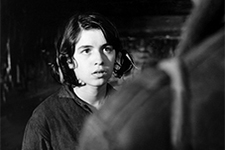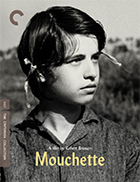Mouchette
|  It was French director Jean Renoir who said that great directors make the same film over and over again, which is his way of saying that committed artists are unable to tear themselves away from the themes they find most meaningful. It becomes part of the fabric of their artistry, the well from which they derive their power. This could certainly be said of director Robert Bresson, who, with a series of austere, piercing dramas made over a 30-year period, created a body of work that spoke simultaneously to the despair and elation of human existence. His work is utterly and completely unique, standing apart from so many of the “art film” directors who made their mark in the 1950s and ’60s. However, there is always a danger when filmmakers like Bresson stick so closely to a chosen theme, especially when said theme is intricately coupled with a particular aesthetic. The danger is that their work could begin to feel tired and strung out. In this case, it usually means that the last film in a given thematic cycle seems the weakest, not necessarily because of its individual traits, but because its thematic preoccupations have already been exhausted by previous films. This is the only explanation I could come up with as to why I was not nearly as moved by Mouchette as I have been by Bresson’s thematically similar films, including Diary of a Country Priest (1950), Pickpocket (1953), and, most importantly, Au hasard Balthazar (1966), which is not only his masterpiece, but one of the greatest films ever made. Mouchette plays on many of the same themes, particularly the role of cruelty in the human condition and the way in which power is deployed against those who do not have it. Bresson’s cinema is often seen as depressing, except by those who recognize the role of transcendence in his work and how humanity always shines through, even in the most dire of circumstances. Yet, Mouchette feels unrelentingly depressing, perhaps because Bresson pours on the agony as never before. At least in Au hasard Balthazar, the central protagonist was a donkey, which adds a metaphorical level to the literal-minded realism and allows us to view the animal’s suffering in terms both intimate and symbolic. Mouchette’s tale of a downtrodden, poverty-stricken adolescent who is beaten, mocked, and mistreated by everyone around her lays the misfortunes on a little too thick, as if Bresson were trying to outdo his previous excursions into transcendental misery. Shot in the French countryside, Mouchette plays much like a companion piece to Balthazar; one might even imagine the two films taking place in nearby villages. Nadine Nortier, one of Bresson’s “models” who never appeared in another film, plays the 14-year-old title character, endowing her with a sense of scrappy resilience that is slowly but surely chipped away by life’s misfortunes. Mouchette is the daughter of an alcoholic, bootlegging father (Paul Hebert) and a mother (Marie Cardinal) who is so sick that most of her responsibilities fall on Mouchette’s shoulders, including care for a small baby. At school, Mouchette is mishandled by her teacher, physically forced to sing a song about Christopher Columbus that begins not incidentally with the lyric “Hope! Hope is dead!” Her schoolmates dismiss her as they ride off on the back of older boys’ motorcycles, and Mouchette’s only recourse is to sling mudballs at them, a pathetic gesture of rebellion if ever there were one. More misery awaits, though, primarily in the character of Arsène (Jean-Claude Guilbert), a drunken poacher with whom Mouchette shares an important secret. But, even he turns on her in a nasty about face after she tenderly cares for him during an epileptic seizure. Yet, for all the misery and heartbreak, you can still sense Bresson’s underlying faith in the transcendence of the metaphysical over the earthly if you look hard enough. Ironically, Mouchette is probably one of Bresson’s most accessible films because it uses far less elliptical storytelling than many of his later works; yet, its bleakness will be hard for many viewers to wade through in order to find the silver lining. For those who understand Bresson and appreciate his worldview, the dying priest’s proclamation that “All is grace” at the end of Diary of a Country Priest, which has been misinterpreted as ironic by far too many critics who are unwilling to entertain such hope in a serious artistic work, will resonate throughout Mouchette’s final moments, which, like Balthazar, offer death as a form of release. Yet, while Balthazar’s final moments on the hillside surrounded by angelic sheep is one of the great, heartbreaking moments in all of cinema, Mouchette’s final image of a lake following the unmistakable sound of a body splashing into the water, is a more difficult image to wade through. It is too easy to see it as unrelievedly grim—the final desperate act of an emotionally destroyed soul whose last, futile attempt at connection with another person goes tragically unheard.
Copyright © 2020 James Kendrick Thoughts? E-mail James Kendrick All images copyright © The Criterion Collection | |||||||||||||||||||||||||||||
Overall Rating: 

 (2.5)
(2.5)


